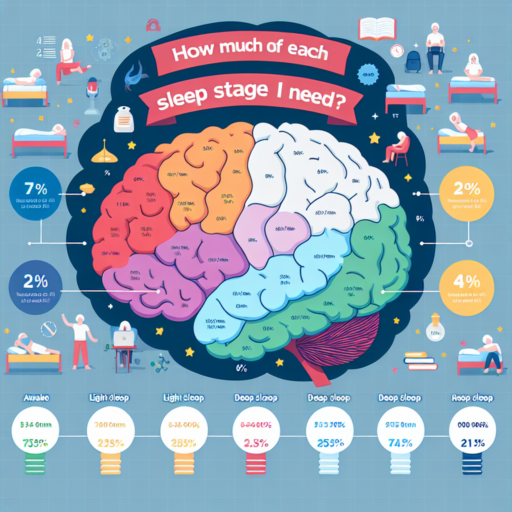How much time do you need in each sleep stage?
Understanding the amount of time you need in each sleep stage is crucial for optimizing your sleep quality, enhancing cognitive function, and maintaining overall health. The sleep cycle is composed of multiple stages, each vital for different aspects of health and well-being. Let’s delve into the specifics of each stage and the recommended duration one should spend in them.
The Four Stages of Sleep
- NREM Stage 1: This is the lightest stage of sleep, often considered the transition phase between wakefulness and sleep. Typically, individuals spend about 5-10% of their sleep in this stage, equating to roughly 5-15 minutes for most people.
- NREM Stage 2: Making up approximately 45-55% of total sleep time for adults, this stage is characterized by a decrease in heart rate and body temperature. It serves as a period of light sleep before entering deeper sleep states, lasting about 25-30 minutes in each cycle.
- NREM Stage 3: Often referred to as deep sleep or slow-wave sleep, this stage is essential for physical recovery, memory consolidation, and hormonal regulation. It’s recommended to spend 20-25% of sleep in this stage, which translates to roughly 20-40 minutes per cycle.
- REM Sleep: This stage is crucial for emotional regulation, learning, and memory. Most adults should aim for 20-25% of their sleep to be in REM, occurring roughly 90 minutes after falling asleep and lasting around 10-60 minutes.
Focusing on the distribution of time spent in each sleep stage can help tailor habits and routines to promote a more restorative night’s sleep. Remember, the quantity of sleep is important, but the quality and the balance between these stages are pivotal for waking up refreshed and ready to face the day.How much deep light and REM sleep should I get?
Understanding the right amount of deep, light, and REM sleep you should get is crucial for optimizing your health and overall well-being. These stages of sleep serve different purposes in rejuvenating your body and mind, and striking the right balance between them is the key to waking up feeling refreshed and energetic.
Deep Sleep Requirements
Deep sleep, also known as slow-wave sleep, is essential for physical recovery, immune function, and growth hormone release. Experts suggest that adults aim for 1-2 hours of deep sleep per night, which typically constitutes about 20% of total sleep for healthy adults. This stage of sleep is critical for memory consolidation and the restoration of energy levels.
Light Sleep and Its Importance
Light sleep makes up the largest portion of your nightly sleep cycle, acting as a transition period between deep sleep and REM sleep. Although it’s considered less restorative than deep or REM sleep, light sleep plays a significant role in brain detoxification and cognitive health. On average, adults should spend 50-60% of their sleep in this stage, equating to roughly 4-6 hours for most people.
Optimizing Your REM Sleep
REM (Rapid Eye Movement) sleep is paramount for emotional regulation and memory processing. It’s when most dreaming occurs, and your brain is almost as active as when you’re awake. Health experts advocate for 20-25% of your overall sleep to be in REM, which translates to roughly 1.5-2 hours for someone sleeping 8 hours a night. Achieving sufficient REM sleep is associated with improved problem-solving skills and creativity.
Each sleep stage plays a unique and vital role in maintaining optimal health. Monitoring your sleep patterns can help you understand if you’re getting the right balance of deep, light, and REM sleep required for functioning at your best.
What stage of sleep do you want the most of?
Understanding the different stages of sleep is crucial in recognizing which one contributes the most to our well-being. Sleep can be broadly categorized into REM (Rapid Eye Movement) and non-REM phases, each playing a unique role in our health. However, when pondering what stage of sleep you want the most of, it’s not about favoring one phase over another but ensuring a balanced cycle throughout the night.
Non-REM sleep consists of three stages, ranging from light to deep sleep. The deep sleep phase, also known as stage three, is particularly noteworthy for its restorative effects on the body. During this stage, your body repairs tissues, builds bone and muscle, and strengthens the immune system. Achieving a sufficient amount of deep sleep can improve memory, support growth and development, and decrease the risk of certain health conditions.
REM sleep, on the other hand, plays a pivotal role in cognitive functions, including learning, memory processing, and emotional regulation. As the night progresses, REM sleep periods become longer, peaking in the early morning hours. It is during REM that most dreaming occurs. Balancing both REM and deep non-REM sleep is essential for optimal health and well-being, as they complement each other by providing both physical restoration and mental health benefits.
How important is each sleep stage?
Understanding the importance of each sleep stage is crucial for recognizing the role of sleep in our overall health and well-being. Sleep is often considered as a single uniform block of time, yet it consists of several stages, each serving different physiological and cognitive functions. These stages are part of a cyclical process that our bodies go through multiple times during the night.
NREM (Non-Rapid Eye Movement) Sleep
The NREM phase encompasses the first three stages of sleep, each differing in depth and function. Initially, we drift from wakefulness into light sleep, during which the body begins to slow down. Muscles relax, heart rate drops, and body temperature decreases. This stage is important for transitioning into deeper sleep. As we move into the second stage, the body enters a more subdued state, with significant reductions in movement and sensory awareness, preparing our bodies for the deep restorative sleep that follows. The third stage of NREM is when the body undergoes most of its physical rejuvenation, tissue repair, and growth hormone release, highlighting the crucial role of deep sleep in physical health.
REM (Rapid Eye Movement) Sleep
Following the NREM stages, the REM stage marks a distinct shift in brain activity. Known for vivid dreams, REM sleep sees an increase in brain activity, similar to when we are awake. This stage is critical for cognitive functions such as memory consolidation, learning, and emotional regulation. The cyclic nature of these stages underscores the importance of uninterrupted sleep, as disruption may prevent the proper progression through necessary restorative stages, impairing mental and emotional health.
In summation, each sleep stage plays a pivotal role in our overall health and cognitive function. The transition from light to deep NREM sleep is foundational for physical restoration, while REM sleep is essential for mental and emotional well-being. Recognizing the importance of each enables us to appreciate the complex nature of sleep and its significant impact on our daily lives.




